subscribe or unsubscribe
new email address?
send us your comments
version française |
Winter 2011 / Spring 2012
Issue no. 18 |
|
| Welcome to the European Language Gazette, an online newsletter keeping you up to date with news about ECML events, projects and resources as well as developments in the Language Policy Division and other relevant sectors of the Council of Europe´s work. The Gazette is published two times a year in Summer/Autumn and in Winter/Spring. Subscribers are informed by e-mail when each new issue is published. We hope you appreciate this issue and look forward to your feedback. |
|

The increased mobility of people and the globalisation of social and economic processes stimulated by rapid innovations in communication technology create new challenges for educational systems in Europe, such as the reality of progressively more multilingual and multicultural classrooms, the need for compatibility between educational systems and qualifications, and the increased use of mobile media. These challenges call for the urgent development and implementation of new quality approaches to European education in general, and language education in particular (policy-making, teacher education, learning, teaching, and assessment).
The Council of Europe aims at maintaining and enhancing linguistic and cultural diversity in Europe and promoting learning and use of languages as a means to support intercultural dialogue, social cohesion and democratic citizenship, and as an important economic asset in a modern knowledge-based society. The Council of Europe’s efforts in this respect are well illustrated by the development of such reference documents and tools as the Common European Framework of Reference for Languages (CEFR) and the European Language Portfolio (ELP), conventions such as the European Charter for Regional or Minority Languages, and policy documents such as the White Paper on Intercultural Dialogue “Living together as equals in dignity”, the Guide for the development of language education policies in Europe, the quite recent Recommendation (2008)7 on The use of the Council of Europe's “Common European Framework of Reference for Languages” and the promotion of plurilingualism, the recent Guide for the development and implementation of curricula for plurilingual and intercultural education and the most recent Report of the Group of Eminent Persons of the Council of Europe Living together: Combining diversity and freedom in 21st-century Europe.
In this context, the European Centre for Modern Languages of the Council of Europe (ECML) is launching its fourth medium-term programme of activities Learning through languages: promoting inclusive, plurilingual and intercultural education (2012-2015). The programme aims to offer foundations for a coherent concept of inclusive, plurilingual and intercultural education and reflects both the mission of the Centre and the current concerns of its member states and partners in the area of language education. It is based on a long-term vision aiming towards developing inclusive, plurilingual and intercultural pedagogic approaches reaching beyond the foreign language classroom and encompassing all linguistic abilities and needs of all groups of learners in a lifelong-learning process (in-school and out-of-school).
2011 was an important and extremely busy year in the Centre’s work. The 3rd medium-term programme of the ECML activities Empowering Language Professionals (2008-2011) was successfully concluded with an impressive set of new tools, websites and publications resulting from the work coordinated by 23 international expert teams. Their presentations during the international conference organised in September 2011 were met with genuine interest and appreciation by our stakeholders and partners participating in the event.
The rationale for the next ECML programme is based upon key issues raised during the thorough consultation process with all ECML partners and stakeholders. Emerging from these consultations is a new, modern concept of education to meet the needs of plurilingual people living in increasingly multilingual societies – people who are capable of using several languages at different levels of competence, living in and contributing to an integrated society and to an international interaction.
In the current discussions on developing a new profile for the work of the Council of Europe the important role and contribution of specialised partial agreements such as the ECML has been specifically highlighted. The Centre, with its significant experience and expertise and an impressive network of professionals in the field, is well suited to fulfilling this role.
The mission of the ECML and, at the same time, the added value of the Centre consists in its role as an initiator and coordinator of international cooperation. The activities coordinated by the Centre are carried out by international experts willing to share their experience, explore new concepts and promote innovative approaches. Their consolidated effort is truly impressive. The work of the Centre is supported by a wide network of partners acting as National Contact Points and National Nominating Authorities in the ECML member states. Their contribution, in their national context, as disseminators and multipliers of ideas, approaches and tools developed by the Centre’s project teams is invaluable.
The efficient functioning of the Centre is supported by the considerable engagement of the Austrian authorities – significant financial support is provided jointly by the federal authorities, the authorities of the Province of Styria and the City of Graz – represents an example of excellent intergovernmental cooperation.
In the midst of the ongoing economic crisis, where national resources are scarce, significant pressure is placed on states to justify their investment in international cooperation. Efforts to sustain this cooperation are to be valued today more than ever. Sharing knowledge and deriving benefit from the experience and good practice of other countries through dialogue and networking on an international and intergovernmental level represents not only an efficient but also a cost-effective means of dealing with current challenges facing language education. In this respect we would like to thank the Centre’s member states for their continued support and commitment to the ECML. We look forward to assisting states both in the application of the brand new array of language education instruments developed within the Empowering language professionals programme and in addressing their primary concerns in language education within the Centre’s innovative new programme, Learning through languages, with its activities starting in January.
Very best wishes from the ECML for 2012.
Waldemar Martyniuk
Executive Director of the ECML
back to top
|

View programme website
23 projects supporting member states in promoting and disseminating innovation and good practice in the learning and teaching of modern languages, over 400 events directly involving 4 000 participants in 40 states and in Europe and beyond, contributions to over 300 conferences, seminars and workshops worldwide, more than 20 sets of publications made available to language professionals – this is the impressive quantitative balance of the activities coordinated by the ECML over the last four years.
Beyond figures, the ECML programme Empowering Language Professionals is characterized by a full range of high priority topics in language education in Europe focusing on quality in testing and assessment, the use of the European Language Portfolio and new media in language teaching and learning, content and language integrated learning and the support of plurilingual repertoires as a task for teachers of any subject. All projects were completed successfully thanks to the full commitment of coordinators and team members, the participants in networks and workshops and to all ECML partners on a national and European level.
Publications resulting from the projects
All project results are presented on websites dedicated to the publication of each project. Some of these websites present major developments like a database (e.g. the website of the Framework of Reference for Pluralistic Approaches - CARAP/FREPA) or an interactive working platform (e.g. the website of the project Developing Online Teaching Skills - DOTS).
A promotional A4 flyer has been produced for each publication. These flyers are available for download on each publication website. An example of a flyer of the publication Plurilingualism and pluriculturalism in content teaching – A training kit can be downloaded here.
The pdf files of the printed publications will be available for free download on the publication websites from January 2012.
view conference website
Over 200 language education specialists from all over Europe and from Canada participated in the closing conference of the Empowering Language Professionals programme taking place from 29 September to 1 October. The conference featured the results of the 23 projects supporting member states in promoting and disseminating the work of the Centre. Key note speeches were given by Ólöf Ólafsdóttir, Director of Education and Languages, representing the Secretary General of the Council of Europe, Teresa Condeço, Multilingualism Policy Unit of the European Commission, Anne Brasseur, member of the Parliamentary Assembly of the Council of Europe, Graham Fraser, Commisioner of Official Languages, Canada, Ana Perona-Fjeldstad from the European Wergeland Centre in Oslo, Johanna Panthier from the Language Policy Division and Jim Cummins, University of Toronto, Canada.
back to top
|
Available for free download from the ECML website - unless otherwise mentioned
Thematic Area: Evaluation
|
|
|
AYLITT
Assessment of young learner literacy linked to the Common European Framework of Reference for Languages
The handbook for teachers is designed to assist in the assessment of reading and writing in the primary language classroom.
|
|
|
CEFESTIM
Common European Framework of Reference for Languages - level estimation grid for teachers
The online CEF-ESTIM training kit provides a grid, examples and guidelines to apply to classroom activities and texts targeting the range of A2 to B2 levels. FlyerWebsite
|
|
|
ECEP
Pathways through assessing, learning and teaching in the CEFR
"Pathways" - guide and kit - aims at supporting ownership and contextualization of the Common European Framework of the Reference for Languages (CEFR). The guide provides a user-friendly tool for accessing the ‘nitty gritty’ of the CEFR. The kit assists teacher educators in devising training paths for understanding the principles of the CEFR and for envisaging links with classroom practice.
|
|
|
EPOSTL2
Using the European Portfolio for Student Teachers of Languages
The publication presents examples, discussions and research findings of how the EPOSTL is used in initial teacher education courses, in bi-lateral teacher-education programmes and in teaching practice. FlyerWebsite
|
|
|
GULT
Guidelines for university language testing
The publication explains how languages for specific purposes (LSP) can be tested in the university context using a task-based approach. It shows how such an approach to language testing can be used in various settings and how task-based language tests are devised and administered. FlyerWebsitePresentation
|
|
|
QUALITRAINING
QualiTraining at Grassroots Level
The "QualiTraining Guide" provides a framework and the tools for facilitating the implementation of quality principles and procedures at grassroots level. It is, thus, relevant both for individual professional development and for team / institutional contexts focusing on consolidating their "quality culture". FlyerWebsite
|
|
|
RelEx
Relating language examinations to the Common European Framework of Reference for Languages Highlights from the Manual
The publication offers an introduction to linking examinations to the Common European Framework of Reference for Languages in a valid way. The highlights are targeted at producers of language examinations, who are less familiar with psychometric procedures and who are not (yet) assessment experts.
FlyerWebsitePresentation
|
Thematic Area: Content and Language Education
|
|
|
CLIL-CD
European Framework for CLIL Teacher Education
The European Framework for CLIL Teacher Education provides a set of principles and ideas for designing curricula for professional teacher development in the area of content and language integrated learning.
FlyerWebsite |
 |
CLIL-LOTE-GO
Enseigner une discipline dans une autre langue : Méthodologie et pratiques professionelles
The publication addresses theoretical aspects and gives examples of good practice in content and language integrated learning (CLIL, also known as "bilingual education") taken from language-centred and non-language subject-centred classes. The manual has been designed for teachers of non-language subjects in French and German in pre- and in-service teacher training.
Flyer
Website
Presentation
|
 |
CLIL-LOTE-START
Content and Language Integrated Learning through languages other than English – Getting started
The publication (brochure and website) provides insights into different forms and ways of putting into practice content and language integrated learning (CLIL) in primary and secondary education, pre- and in-service teacher education, as well as in the field of research and school development. It promotes the CLIL approach to a wider target public, beyond the area of specialists.
|
 |
CONBAT+
Plurilingualism and pluriculturalism in content teaching
The training kit shows in which way the languages and cultures present in the classroom can be developed as a cross-curricular resource at primary and secondary level. It offers twenty-six content-based didactic units in English, French and Spanish to be used in classrooms. FlyerWebsitePresentation
|
 |
EPLC
Enseignement précoce des langues par des contenus disciplinaire - Une approche interculturelle, transdisciplinaire et basée sur l'autonomie de l'apprenant
The publication includes CLIL teaching modules for use in primary school. The content-based modules provide worksheets for students as well as guidelines for primary school teachers.
Flyer
Website
Presentation
|
Thematic Area: Continuity in Language Learning
|
 |
DOTS
Developing Online Teaching Skills - Bite-size training for language professionals
The training kit is a tool for language teachers which promotes up-to-date online teaching technology including bite-size activities for online language teacher training, suggestions for reflective activities and collaborative tools for sharing "self-training" experiences. FlyerWebsite
|
 |
ELP-TT3
Training teachers to use the European Language Portfolio
Following the development of a new Council of Europe portal for the European Language Portfolio including a new registration system for ELP models the ECML presents a dedicated section on the use of the ELP in a wide set of contexts including teacher training.
|
 |
ELP-WSU
The European Language Portfolio
A guide to the planning, implementation and evaluation of whole-school projects
The guide explains how to use the European Language Portfolio to support the learning and teaching of all foreign languages at all levels in a school. Case studies carried out in ten countries illustrate different approaches to ELP use. FlyerWebsitePresentation
|
 |
E-VOLLUTION
Exploring cutting edge applications of networked technologies in vocationally oriented language learning
The website and publication are targeted at teachers and teacher-trainers in VOLL Vocationally Oriented Language Learning). They explain the background to the different aspects of ICT inVOLL, describe the steps involved in carrying out various ICT-based activities and provide practical examples and links to case studies on the VOLL website.
|
 |
PLURIMOBIL
Mobility for plurilingual and intercultural education – tools for language teachers and teacher trainers
The publication offers a ‘double learning scenario’ for trainee teachers and pupils in primary and secondary school including a user guide for pedagogical monitoring of mobility experiences, both real and virtual. FlyerWebsite
|
Thematic Area: Plurilingualism
|

|
CARAP
A framework of reference for pluralistic approaches to languages and cultures
This set of publications opens ways for implementing pluralistic approaches in classrooms in order to develop the plurilingual and intercultural competences of learners of all subjects.
|
 |
EBP-ICI
Langues régionales/minoritaires dans l'éducation bi-/ plurilingue - Langues d'ici, langues d'ailleurs
Based on European objectives to favour linguistic diversity and plurilingual and pluricultural education, the publication presents pilotedmaterials, activities and didactic tools. These are related to a theoretical framework which creates links between dominant languages and minority or regional languages in Europe and beyond. A teaching kit also offers a collection of practical examples and recommendations for policy-makers in the area of education.
|

|
LACS
Language associations and collaborative support
The publication is aimed at those involved in the running of language teacher associations at international, national, regional and local levels. This may include paid employees or, more frequently, volunteers. It provides guidance on the effective running and networking of associations. FlyerWebsite
|
 |
MARILLE
Majority language instruction as basis for plurilingual education
To show how plurilingualism can be fostered in majority language teaching (for example, the teaching of Spanish in Spain or Polish in Poland) in secondary schools, this publication offers concrete examples for teacher development and strategies for change management. FlyerWebsitePresentation |
back to top
|
In response to the Call for Submissions of the ECML the Centre received 53 project proposals and over 200 individual applications. An expert advisory board compiled a list of 25 submissions for recommendation to the ECML Governing Board. It has been necessary to make a number of adjustments to the originally envisaged scope of the programme as well as to the formats of activities. Eventually 15 projects have been selected for the programme.
In parallel to launching project work for the new programme, the Centre will establish more flexible formats of activities providing direct, targeted assistance to its member states, focusing, in particular, on achieving tangible impact at a national level. Thus, the ECML is currently developing a concept for a new domain of operation entitled “Targeted support to the ECML member states” to focus on identified priority topics of interest for its members. This initiative seeks to work in closer contact with representatives of ECML member states and to provide direct consultation and training in areas of identified needs.
The new programme will truly focus on the learner, the learner’s needs and the learner’s perspective. It will underline the learners’ right to open and lifelong access to quality education and highlight the fact that the learners' educational careers are based on adequate development of language competences. Thus it will promote approaches for valuing all learners' languages and cultures which are key to successful integration in learning communities and societies.
Projects included in the new programme will promote inclusive approaches and aim at developing plurilingual and intercultural competences considering both, formal and informal/non-formal learning contexts.
Details of the new programme including project titles will be published on the ECML portal in Spring 2012. The calendar of activities for 2012 will be available as of January 2012 and will continue to be updated throughout the year. Participation at workshops will continue to be carried out via nominations by the ECML’s National Nominating Authorities.
For details please consult the calendar for events and contact the Nominating Authority of your country.
back to top
|

The European Day of Languages is 10 years old and thriving! This year the Day inspired greater numbers than ever before around Europe and beyond to become involved in what is a unique celebration of languages and their diversity. Over 600 individual events were recorded in the EDL’s calendar, with activities even taking place as far afield as India, Canada and Australia. To get an impression of the popularity of the Day and the variety of actions organised, visit our picture gallery for 2011. The greatest number of events were registered in: Austria (99), Germany (97), France (84), UK (53), Italy (53), Spain (44), Czech Republic (36) and Romania (38) and this is, quite possibly, just the tip of the iceberg!
Joint Declaration of the Council of Europe and the European Commission
The anniversary was also marked with a Joint Declaration by the Secretary General of the Council of Europe, Thorbjørn JAGLAND, and the European Commissioner for Education, Culture, Multilingualism and Youth, Androulla VASSILIOU. The Declaration, available in 25 languages, welcomed: '… progress made during the past decade in raising awareness about Europe's rich linguistic heritage, encouraging multilingualism in society and in motivating European citizens to learn more languages' and reaffirmed the commitment of both organisations '…to encourage lifelong language learning for personal fulfilment, full participation in Europe's democratic societies and professional development'.
The Declaration also highlighted the particular importance of languages in today’s environment, ‘Against the current backdrop of increasing mobility, globalisation of the economy and changing economic trends, the need to learn languages and develop plurilingual and intercultural education is more obvious than ever before.’
The Declaration made specific reference to the work of the ECML and the importance of developing further synergies with the Commission.
New features in 2011
New features on the EDL website this year included.
- an online voting feature for the ‘EDL’s most innovative event’ was added to the events calendar. The inaugural winner was Grabrik primary school from Croatia. Their event, with the intriguing title ‘Look at me, I am beautiful’. received over 650 votes during the voting period 1 September – 20 October. Congratulations to this year’s winners!
- sign languages have been given greater prominence on the website through a special FAQ area, developed with the assistance of members of the European Union of the Deaf and a new section on the EDL quiz on this area had been added: In addition, the Language Policy Division organised an event entitled ‘Sign languages - a unique contribution to our linguistic and cultural diversity’ in co-operation with the EUD;
- an EDL video clip developed by the ECML is featured on the main page of the site. The clip was screened on the Austrian television network ORF and ARTE has agreed to broadcast the clip in the run up to the 2012 EDL.
Great credit for the continued success and celebration of the Day goes to the EDL National Relays.
Thank you to all involved in the EDL events this year for your enthusiasm and commitment!
Creative ideas - a selection of 10 events
1: Croatia - Look at me, I am Beautiful
2: Austria - Linguistic Tour
3: France - Le Mur des Salutations
4 : WWW - Tweet Another Language Day – Adults/Business
5: Germany - Getting too Personal?
6: INT - Plurilingualism, Identity, Diversity
7: United Kingdom - The Social Climber
8: WWW Twister Tongue
9: Hungary - The Big Success Story Hunt
10: Sweden - EDL Rap Video Contest
The Day differs from the Centre’s other activities in that it is not focused on a specialist target public but encompasses everyone interested in languages. With activities often organised as large-scale events in city and town centres around the continent as well as in schools, universities, adult learning centres, and businesses the EDL has a potential audience of millions of Europeans.
back to top
|
National Contact Points for the ECML:
Value of expertise of 35 countries
 National expertise in the ECML activities 2008-2011 is highlighted on the Centre’s website dedicated to its National Contact Points in the member states and in Canada. The page “Experts involved in ECML activities” includes the contact details and the activities in which nominated experts were involved during the programme of activities Empowering language professionals. National expertise in the ECML activities 2008-2011 is highlighted on the Centre’s website dedicated to its National Contact Points in the member states and in Canada. The page “Experts involved in ECML activities” includes the contact details and the activities in which nominated experts were involved during the programme of activities Empowering language professionals.
ECML impact
provide a summary of the activities organised within the framework of the Centre’s programme Empowering language professionals in order to promote the work within 35 countries through national networks working in the field of language education. The reports focus in particular on the activities organised, the target audiences, and the impact achieved. The annual reports 2011 will be published online in 2012.
- Consult the reports at http://contactpoints.ecml.at > Select a country > See section "Annual activity reports of the National Contact Point"
The Austrian Language Competence Centre published a brochure in 2011 outlining examples of practice with regard to the implementation of the European Language Portfolio for Language Students in Austria. The brochure includes 8 chapters describing the EPOSTL, presenting concrete examples on how the EPOSTL has been implemented in initial and further language teacher education, and providing an overview of implementation strategies in this field. The selected examples highlight, in particular, the implementation of the tool in English language teacher education at the University of Vienna, the romance studies department at the University of Salzburg, the didactics course designed for future language teachers at the University of Graz, at the Styrian college of education (Pädagogische Hochschule), in a French language teacher training programme in secondary education, and the inclusion of the EPOSTL into a manual designed for training English language teachers in vocational education.
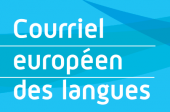 The Courriel européen des langues is a free online newsletter issued three times a year by CIEP (International Centre for Pedagogical Studies), the National Contact Point for the ECML in France. The newsletter provides information on the activities of the Council of Europe and the European Union in the field of language policy. It publishes, in particular, articles on ECML activities and publications and on French participation in the Centre’s workshops. The Courriel européen des langues is a free online newsletter issued three times a year by CIEP (International Centre for Pedagogical Studies), the National Contact Point for the ECML in France. The newsletter provides information on the activities of the Council of Europe and the European Union in the field of language policy. It publishes, in particular, articles on ECML activities and publications and on French participation in the Centre’s workshops.
Topics of Issue no. 23 (November 2011): Closing Conference of the 3rd medium-term programme of activities 2008-2011 (Graz, 28 September – 1st October 2011), European Day of Languages 2011 and French participation in the ECML workshop “The European Language Portfolio in whole-school use (ELP-WSU)” (19-20 May 2011).
Topics of Issue no. 22 (June 2011): ECML project “A Framework of Reference for Pluralistic Approaches – FREPA/CARAP”, French participation in the ECML workshop “ Minority Languages, Collateral Languages and Bi- /plurilingual Education (EBP-ICI)" (Graz, Austria, 16-18 February 2011), status of the selection process of the Centre’s fourth medium-term programme of activities 2012-2015 “Learning through languages: promoting inclusive, plurilingual and intercultural education” and online video presenting the European Language Portfolio and sample activities.
 The UK’s National Centre for Languages, CILT, carried out an online survey on the benefits of participating at an ECML workshop and on the wider benefit of UK involvement in the ECML. The respondents to the survey represented national organisations, senior lecturers, teacher trainers and directors of university languages centres, all well-placed to influence and disseminate ECML work. The following sample response highlights the added value of ECML cooperation: “Our (UK) engagement with the ECML and other bodies represents a belief that languages are an invaluable part of our shared intellectual and cultural heritage. Sharing these intellectual benefits undoubtedly contributes to our economic benefit”. The UK’s National Centre for Languages, CILT, carried out an online survey on the benefits of participating at an ECML workshop and on the wider benefit of UK involvement in the ECML. The respondents to the survey represented national organisations, senior lecturers, teacher trainers and directors of university languages centres, all well-placed to influence and disseminate ECML work. The following sample response highlights the added value of ECML cooperation: “Our (UK) engagement with the ECML and other bodies represents a belief that languages are an invaluable part of our shared intellectual and cultural heritage. Sharing these intellectual benefits undoubtedly contributes to our economic benefit”.
back to top
|
INGO Professional Network Forum

The 2nd meeting of the INGO Professional Network Forum, held at the ECML on 6 January 2011, involved the founding members of the Forum: AILA, ALTE, CEL/ELC, CercleS, EAQUALS, FIPLV, EALTA, ICC and OLBI, and 3 new members: the International Association of Multilingualism (IAM), the European Union National Institutes for Culture (EUNIC) and the European Parents’ Association (EPA). The Forum partners provided an excellent channel of communication for the Call for submissions to the next ECML programme, using their own extensive dissemination networks for its promotion. The concept and the envisaged content for the new ECML programme reflect to a considerable extent the message included in the Graz Declaration on Language Education 2010 adopted as the result of the first meeting of the Professional Network Forum in January 2010 and promoted throughout the Network. At the upcoming meeting, scheduled for 2 February 2012, the involvement of the partners in the new ECML programme will be discussed. The Centre intends to propose to renew the Memorandum of Cooperation signed with the partners of the Professional Network Forum to also cover the duration of the 4th medium-term programme 2012-2015.
 The Council of Europe and the European Union share the aims of preserving linguistic and cultural diversity in Europe and promoting learning and use of languages as a means to support intercultural dialogue, social cohesion and democratic citizenship, and as an important economic asset in a modern knowledge-based society. There is a recognised need on both sides for more consolidated cooperation. This is specifically important in the current context of the Centre planning the dissemination of the results of its current programme and preparing for its 2012-2015 programme of activities. The Council of Europe and the European Union share the aims of preserving linguistic and cultural diversity in Europe and promoting learning and use of languages as a means to support intercultural dialogue, social cohesion and democratic citizenship, and as an important economic asset in a modern knowledge-based society. There is a recognised need on both sides for more consolidated cooperation. This is specifically important in the current context of the Centre planning the dissemination of the results of its current programme and preparing for its 2012-2015 programme of activities.
Current measures in place:
- The European Commission is systematically represented at the ECML Governing Board meetings through the Head of the EC’s Multilingualism Unit;
- the Multilingualism Unit is also represented within the INGO Professional Network Forum which was launched in 2010 and issued the Graz Declaration on Language Education in March 2010;
- a considerable number of ECML projects illustrate ways in which synergies between the work of the Council and the Union can be achieved. One concrete example is the Centre’s European Portfolio for Student Teachers of Languages which is currently being piloted for implementation and has been translated into 10 languages. The project and the publication draw on the results of the European Profile for Language Teacher Education – a Frame of Reference funded by the European Commission and produced by Southampton University (UK);
- the number of requests for the Centre to become involved as partners in projects financed under the Lifelong Learning Programme of the EC increased considerably in recent years. Following the approval of its Governing Board, the Centre is currently a ‘full’ or ‘associate’ Partner in five projects/campaigns funded by the EC;
- the team of the ‘special support activity’, QualiRom “Quality education for Romani in Europe”, has been successful in its bid for European Commission funding. The new project (http://qualirom.ecml.at) involving 8 partners and 7 associated partners is piloting the Curriculum Framework for Romani (CFR) and the corresponding European Language Portfolio models developed by the Council of Europe;
- the Council of Europe was invited to be a partner in the Language Rich Europe project, initiated by the British Council and funded by the EC, which aims to develop a new European Languages Index highlighting the roles languages play in education, business and broader society and bringing together stakeholders from different disciplines, sectors, age-groups. The ECML has offered its expertise and to host events promoting the results of the project;
- at the ECML 2011 conference the Commission was represented by Teresa Condeco from the Multilingualism Policy Unit of the European Commission who highlighted the need for continued co-operation between the Commission and the Council of Europe in the area of languages – in this, she referred to the joint declaration signed by Commissioner Vassiliou and Secretary General Jagland to mark the 10th anniversary of the European Day of Languages on 26 September 2011.
Ways forward
The new ECML programme 2012-2015 includes a number of themes relevant to the work of the European Commission such as ‘young learners’, ‘CLIL’ and ‘mobility’, where cooperation with other institutions is envisaged. In the longer term a joint action programme on ‘Multilingualism and Plurilingual Education in Europe’ could be established to assist states in Europe and beyond in the implementation of the recommendations on plurilingual and intercultural education issued by the Council of Europe and the multilingualism policies and strategies adopted by the EU.
back to top
|

European Resource Centre on Education for Intercultural Understanding, Human Rights and Democratic Citizenship
The European Wergeland Centre (EWC) is a European resource centre on education for intercultural understanding, human rights and democratic citizenship. It is the result of an innovative cooperation between Norway and the Council of Europe. The Centre is open to all the 47 member states of the Council of Euorpe, and the main target groups are teachers, teacher trainers, decision makers and multipliers within education for intercultural understanding, human rights and democratic citizenship. The mission of the EWC is to build bridges between policy, research and practice. The Centre offers capacity building activities, disseminates resources and organises seminars and conferences for practitioners, trainers, researchers, policymakers and the public at large. The EWC is located in Oslo, Norway.
Latest Developments: Online Resources and a Glossary Project
The EWC has launched its new website!
New information architecture and layout of the EWC website (http://www.theewc.org/) is now in place to easier navigate the site to find and make use of our online resources and to access news, publications and information on EWC activities and other events.
EWC’s website contains several online resources, such as a comprehensive online library that is continuously being updated with research material, teaching manuals, Council of Europe Recommendations and papers; all free and easily accessible to all. EWC’s online network Share & Connect now connects more than 250 professionals working in the field; researchers, teachers, teacher trainers, PhD-students, youth - and NGO workers are part of this network. Share & Connect is open to all and is available at www.theewc.org/network.
The Intercultural Glossary Project
In close co-operation with different partners, the European Wergeland Centre has started to work on an intercultural glossary project in the field of education for democratic citizenship, human rights and intercultural understanding.
Project Partners: Higher School of Economics/ Moscow; University of Hamburg; Federal Agency for Civic Education (bpb); KULTRANS programme/University of Oslo; Centre for Human Rights Education University of Teacher Education Central, Switzerland, Lucerne; Norwegian University of Science and Technology; University of Surrey; Human Rights Education Associates (HREA); The European Wergeland Centre (EWC).
The long term aim of this project is to provide an online resource for education professionals offering definitions and a platform for discussions of key concepts, as well as methods for concept learning. The glossary can be used to facilitate learning processes fostering (self)-reflexivity, multi-perspectivity and information literacy. The content of the online glossary will be produced through peer learning activities with students in different countries.
The project includes:
- the cooperative development of conceptual knowledge and understanding
- the development of an online glossary
- the development of methods for concept learning and
- to initiate a field of research
The project will build on the existing WIKI glossary “Confusing Conversations”, developed by the German Federal Agency for Civic Education and the NECE network.
First peer learning activity started
The first peer learning activity started in fall 2011. Groups of students from the educational faculty of the Norwegian University of Science and Technology (NTNU) in Trondheim (Norway) and the University of Hamburg (Germany) collaboratively explore key concepts in the field of history didactics and history culture.
The glossary project is integrated in different courses at each university. At the NTNU it is part of the course “Cultural meetings”, and during the spring semester 2012 it will be part of the course “key concepts for critical understanding of society”. At the University of Hamburg, the group of German students engages in the glossary project as part of learning about “European Memory Culture”.
The students work on the following concepts: heritage, multiculturality, anti-Semitism, islamophobia, European identity. Each of the students will choose one of the concepts to explore further, including the following steps:
-
Step 1: description of the different meaning(s) the chosen concept has for the individual student
-
Step 2: exploration of existing scientific and popular definitions of the concept
-
Step 3: investigation into the different contemporary contexts influencing the understandings and uses of the concept
-
Step 4: study of how the concept is used historically and trace changes over time.
The collection of ideas and exchange of ideas takes place on an online platform for education, called EduCommSy. The results will be published at the EWC website.
Contact: Dr. Claudia Lenz/EWC: c.lenz@theewc.org
Information about the project is regularly updated at the EWC website (http://www.theewc.org/content/resources/intercultural.glossary.project)
You can now also follow EWC’s activities:
Facebook: http://www.facebook.com/theewc.org
Twitter: http://twitter.com/#!/theewcorg
back to top
|
Traineeships, fellowship and study visit 2011

The ECML benefited from the excellent support of its trainees:
- Belinda Vrapi (January-June) and Ilona Perrot (July-December): programme;
- Anastasia Dimou (January-June) and Olwyn Fagan (July-December): website
- Josef van der Voort (January-June) and Kateřina Lechnýřová (July - December): communication, documentation and resource Centre;
- Clara Grimes: administration (July - December).
as well as of
- Neela Hettling has been recruited on a 3-month fellowship within the framework of the project "Good practice in Content and Language Integrated Learning for languages other than English"CLIL-LOTE-GO; and
- Anni Inkilainen who completed a study visit in February-March.
The ECML staff would like to say a big thank you for their hard work and commitment to the Centre and offer their best wishes to all of them.
In January 2012 the ECML has welcomed its three new trainees: Ana Fe Rodríguez Fuldauer (programme), Alina Monica Condret (website) and Nika Gavrovska (documentation centre).
Apply for an ECML traineeship from July - December 2012
The ECML offers traineeships for recent graduates with an excellent command of at least one of the working languages of the Council of Europe (English, French). Traineeships last 6 months (January to June or July to December) and candidates must apply for one of the areas of the Centre's work: programme activities; communication, information and documentation services; or website. The Centre also offers traineeships in its administration section once a year from September to February.
More information on trainees' profiles, duties and tasks, on living and working conditions in Graz, together with the application procedure and form can be found on the ECML traineeship web pages.
Application deadlines: 31 March 2012 for the period July to December 2012 and 30 September 2012 for the period January to June 2013.
back to top
|
The publications highlighted in yellow in the list of publications below can be ordered in big numbers, e.g. for university classes or teacher training events.
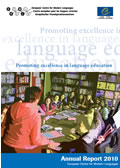 In 2010 the ECML focused, in particular, on the impact of ECML programme activities, on preparing the ECML programme 2012-2015 Learning through languages, the further development of the networking, consultancy and cooperation, redesigning its website, and exploring interactive communication channels. In 2010 the ECML focused, in particular, on the impact of ECML programme activities, on preparing the ECML programme 2012-2015 Learning through languages, the further development of the networking, consultancy and cooperation, redesigning its website, and exploring interactive communication channels.
Download the report: English - French
Related resources
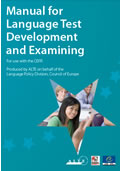 The revised version of the Manual for Language Test Development and Examining - for use with the CEFR prepared by ALTE is a useful addition to the ‘toolkit’, offers support to assessment providers and other practitioners with an interest in language testing in the use of the Common European Framework of Reference for Languages (CEFR). The revised version of the Manual for Language Test Development and Examining - for use with the CEFR prepared by ALTE is a useful addition to the ‘toolkit’, offers support to assessment providers and other practitioners with an interest in language testing in the use of the Common European Framework of Reference for Languages (CEFR).
 Authors: Rehorick Sally, Jóhannsdóttir Kristín M., Parent Milena, Patterson David, October 2011 Authors: Rehorick Sally, Jóhannsdóttir Kristín M., Parent Milena, Patterson David, October 2011
The paper presents the results of a small-scale study on the efficient use of the Common European Framework of Reference for Languages (CEFR) for the self-assessment and placement of language services volunteers at the Vancouver 2010 Olympic and Paralympic Winter Games. This group of volunteers provided highly specialised interpretation services to athletes from the 88 countries represented.
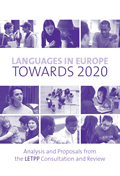 The final publication of the one year project funded though the Life Long Learning programme of the European Union – ‘Languages in Europe, Theory, Policy and Practice (LETPP)’ provides a framework for future consideration of language policy in Europe. Considering the needs of the individual and the community on the one hand, and the priorities of states and societies on the other, it includes a review of current policy and policies at European and national level, an analysis of how things are changing and suggestions for future action in relation to such central issues as The Future Model of Language Policy, The Lingua Franca, Multilingual Education, Languages beyond school (including the importance of immigrant multiligualism), Languages and the Worldwide Web, Multilingual Cities. Among others, the project examined the work of the Council of Europe and considered specific measures which might support linguistic diversity, such as the work of the ECML. The final publication of the one year project funded though the Life Long Learning programme of the European Union – ‘Languages in Europe, Theory, Policy and Practice (LETPP)’ provides a framework for future consideration of language policy in Europe. Considering the needs of the individual and the community on the one hand, and the priorities of states and societies on the other, it includes a review of current policy and policies at European and national level, an analysis of how things are changing and suggestions for future action in relation to such central issues as The Future Model of Language Policy, The Lingua Franca, Multilingual Education, Languages beyond school (including the importance of immigrant multiligualism), Languages and the Worldwide Web, Multilingual Cities. Among others, the project examined the work of the Council of Europe and considered specific measures which might support linguistic diversity, such as the work of the ECML.
King, Lid / Byrne, Nick / Djouadj, Imke / Lo Bianco, Joseph / Stoicheva, Maria, Languages in Europe – Towards 2020: Analysis and proposals from the LETPP Consultation and Review, ISBN 978-0-9564256-2-1, 2011
 Lingu@net is a multilingual website for curriculum writers, teacher trainers, teachers and learners of languages – in fact for anyone interested in languages, accessible in 30 languages. Lingu@net World Wide provides them with access to quality assured online resources (currently 5000 resources in over 40 languages) for teaching and learning languages, from beginner to advanced levels. Lingu@net is a multilingual website for curriculum writers, teacher trainers, teachers and learners of languages – in fact for anyone interested in languages, accessible in 30 languages. Lingu@net World Wide provides them with access to quality assured online resources (currently 5000 resources in over 40 languages) for teaching and learning languages, from beginner to advanced levels.
back to top
|
The linguistic and educational integration of children from migrant backgrounds, Roma children and children belonging to other minority/vulnerable groups
An intergovernmental seminar based on the concept paper published in November 2010 (and the accompanying studies/resources) for pooling good practice (questions relating to both the language of schooling and the languages of origin) will be held in Strasbourg on 7 and 8 March 2012 under the title “Meeting the challenge of multilingual classrooms: exploiting plurilingual repertoires, managing transitions and developing proficiency in the language(s) of schooling”.
back to top
|
In response to the needs expressed by the member states, a number of new tools and resources, are currently being developed. These include guidelines for adapting the Common European Framework of Reference for Languages (CEFR – designed for foreign languages) to the needs of adult migrants; a European Language Portfolio model developed specifically for adult migrants; a self-assessment questionnaire for providers of courses for adult migrants; an analysis of and resources for language learning to meet migrants’ professional needs.
In addition, a third survey (following those of 2007 and 2009) will be conducted among all the ministries concerned in Council of Europe member states in 2012 and the results will be made available at the conference planned for 2013.
An analytical report of the results of the two previous surveys and the main current trends has just been published on-line (www.coe.int/lang).
back to top
|
A second seminar for teacher trainers on use of the AIE in the classroom was held at the European Youth Centre, Strasbourg, from 15-17 June 2011. The 17 participants from 15 countries, including Egypt and Jordan, developed modules for using the AIE and undertook to conduct a number of training sessions in their respective countries by the end of the year. This seminar was organised in co-operation with the Unit for capacity building, mobility and exchanges (Intercultural Education and Exchanges project).
A draft of a companion volume to the AIE - Images of Others, an Autobiography of Intercultural Encounters through Visual Media – is currently being piloted. On-line publication of the final version is planned for autumn 2012.
back to top
|
The Division celebrated the 10th anniversary of the European Day of Languages by holding an event at the Council of Europe in Strasbourg on the contribution of sign languages to Europe’s linguistic and cultural diversity, with the participation of the European Union of the Deaf (EUD) and a member of the European Parliament.
back to top
|
New, redesigned website
www.coe.int/portfolio
Validation of ELP models having ceased at the end of 2010, the new procedure for registering ELPs was tested in the spring. The ELP website has been completely redesigned to accommodate registration as well as provide new resources and templates for developing ELP models and support tools for implementation of the ELP. The new site was opened on 26 September 2011, 10th anniversary of the European Day of Languages. So far two ELP models have been registered and two more are under way.
back to top
|
|
|
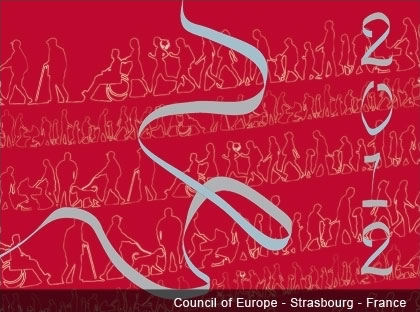


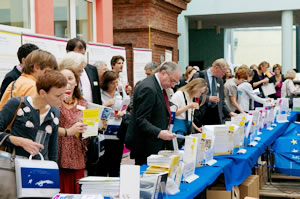
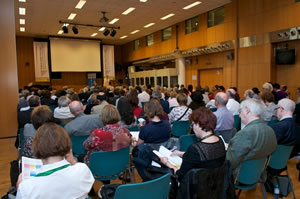





















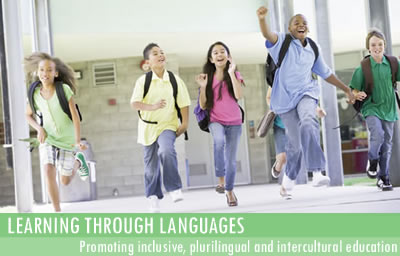
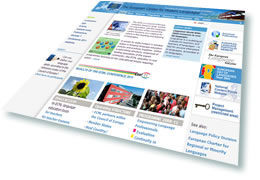
 National expertise in the ECML activities 2008-2011 is highlighted on the Centre’s website dedicated to its National Contact Points in the member states and in Canada. The page “Experts involved in ECML activities” includes the contact details and the activities in which nominated experts were involved during the programme of activities Empowering language professionals.
National expertise in the ECML activities 2008-2011 is highlighted on the Centre’s website dedicated to its National Contact Points in the member states and in Canada. The page “Experts involved in ECML activities” includes the contact details and the activities in which nominated experts were involved during the programme of activities Empowering language professionals.
 The Courriel européen des langues is a free online newsletter issued three times a year by CIEP (International Centre for Pedagogical Studies), the National Contact Point for the ECML in France. The newsletter provides information on the activities of the Council of Europe and the European Union in the field of language policy. It publishes, in particular, articles on ECML activities and publications and on French participation in the Centre’s workshops.
The Courriel européen des langues is a free online newsletter issued three times a year by CIEP (International Centre for Pedagogical Studies), the National Contact Point for the ECML in France. The newsletter provides information on the activities of the Council of Europe and the European Union in the field of language policy. It publishes, in particular, articles on ECML activities and publications and on French participation in the Centre’s workshops. The UK’s National Centre for Languages, CILT, carried out an online survey on the benefits of participating at an ECML workshop and on the wider benefit of UK involvement in the ECML. The respondents to the survey represented national organisations, senior lecturers, teacher trainers and directors of university languages centres, all well-placed to influence and disseminate ECML work. The following sample response highlights the added value of ECML cooperation: “Our (UK) engagement with the ECML and other bodies represents a belief that languages are an invaluable part of our shared intellectual and cultural heritage. Sharing these intellectual benefits undoubtedly contributes to our economic benefit”.
The UK’s National Centre for Languages, CILT, carried out an online survey on the benefits of participating at an ECML workshop and on the wider benefit of UK involvement in the ECML. The respondents to the survey represented national organisations, senior lecturers, teacher trainers and directors of university languages centres, all well-placed to influence and disseminate ECML work. The following sample response highlights the added value of ECML cooperation: “Our (UK) engagement with the ECML and other bodies represents a belief that languages are an invaluable part of our shared intellectual and cultural heritage. Sharing these intellectual benefits undoubtedly contributes to our economic benefit”.
 The Council of Europe and the European Union share the aims of preserving linguistic and cultural diversity in Europe and promoting learning and use of languages as a means to support intercultural dialogue, social cohesion and democratic citizenship, and as an important economic asset in a modern knowledge-based society. There is a recognised need on both sides for more consolidated cooperation. This is specifically important in the current context of the Centre planning the dissemination of the results of its current programme and preparing for its 2012-2015 programme of activities.
The Council of Europe and the European Union share the aims of preserving linguistic and cultural diversity in Europe and promoting learning and use of languages as a means to support intercultural dialogue, social cohesion and democratic citizenship, and as an important economic asset in a modern knowledge-based society. There is a recognised need on both sides for more consolidated cooperation. This is specifically important in the current context of the Centre planning the dissemination of the results of its current programme and preparing for its 2012-2015 programme of activities.
 In 2010 the ECML focused, in particular, on the impact of ECML programme activities, on preparing the ECML programme 2012-2015 Learning through languages, the further development of the networking, consultancy and cooperation, redesigning its website, and exploring interactive communication channels.
In 2010 the ECML focused, in particular, on the impact of ECML programme activities, on preparing the ECML programme 2012-2015 Learning through languages, the further development of the networking, consultancy and cooperation, redesigning its website, and exploring interactive communication channels. The revised version of the
The revised version of the  Authors: Rehorick Sally, Jóhannsdóttir Kristín M., Parent Milena, Patterson David, October 2011
Authors: Rehorick Sally, Jóhannsdóttir Kristín M., Parent Milena, Patterson David, October 2011 The final publication of the one year project funded though the Life Long Learning programme of the European Union – ‘Languages in Europe, Theory, Policy and Practice (LETPP)’ provides a framework for future consideration of language policy in Europe. Considering the needs of the individual and the community on the one hand, and the priorities of states and societies on the other, it includes a review of current policy and policies at European and national level, an analysis of how things are changing and suggestions for future action in relation to such central issues as The Future Model of Language Policy, The Lingua Franca, Multilingual Education, Languages beyond school (including the importance of immigrant multiligualism), Languages and the Worldwide Web, Multilingual Cities. Among others, the project examined the work of the Council of Europe and considered specific measures which might support linguistic diversity, such as the work of the ECML.
The final publication of the one year project funded though the Life Long Learning programme of the European Union – ‘Languages in Europe, Theory, Policy and Practice (LETPP)’ provides a framework for future consideration of language policy in Europe. Considering the needs of the individual and the community on the one hand, and the priorities of states and societies on the other, it includes a review of current policy and policies at European and national level, an analysis of how things are changing and suggestions for future action in relation to such central issues as The Future Model of Language Policy, The Lingua Franca, Multilingual Education, Languages beyond school (including the importance of immigrant multiligualism), Languages and the Worldwide Web, Multilingual Cities. Among others, the project examined the work of the Council of Europe and considered specific measures which might support linguistic diversity, such as the work of the ECML. Lingu@net is a multilingual website for curriculum writers, teacher trainers, teachers and learners of languages – in fact for anyone interested in languages, accessible in 30 languages. Lingu@net World Wide provides them with access to quality assured online resources (currently 5000 resources in over 40 languages) for teaching and learning languages, from beginner to advanced levels.
Lingu@net is a multilingual website for curriculum writers, teacher trainers, teachers and learners of languages – in fact for anyone interested in languages, accessible in 30 languages. Lingu@net World Wide provides them with access to quality assured online resources (currently 5000 resources in over 40 languages) for teaching and learning languages, from beginner to advanced levels.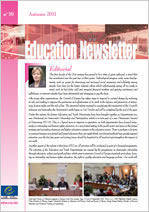 The latest issue provides among others an article on the
The latest issue provides among others an article on the 

